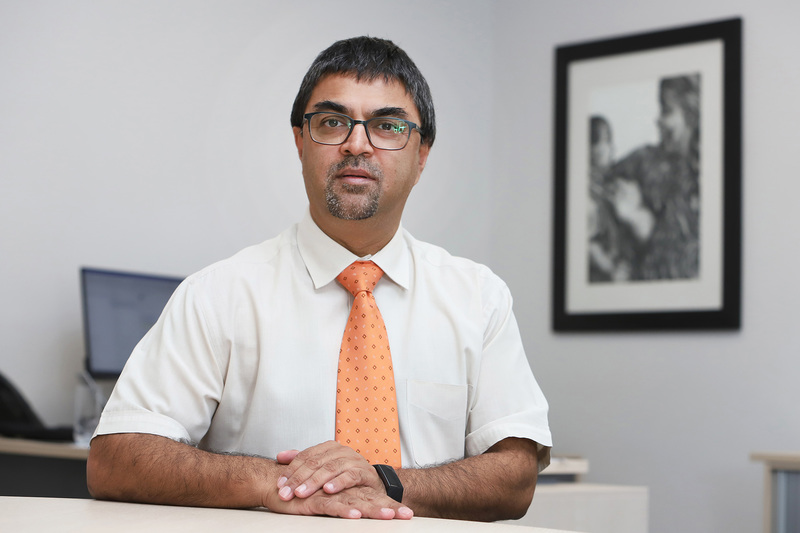Our COVID-19 pandemic – let’s stand together and not drop our guard
16 October 2020 | Dr Reno Morar, COO
Dear students and colleagues
I am writing about a recent increase in the number of COVID-19 cases in and around the University of Cape Town (UCT).
Most UCT students and staff members have exercised good sense in avoiding spaces and places where they could be more exposed to the virus. They are diligent about following protocols such as wearing masks, physical and social distancing, and sanitising or washing hands and surfaces.
I want to thank each of you who has taken their personal and community responsibility so seriously.
It is more important than ever that you continue these safe health practices. The Western Cape Department of Health has identified cluster outbreaks of COVID-19 in the southern suburbs and at least three UCT students have now tested positive for COVID-19 in these outbreaks. We have been alerted to a particularly large cluster (currently 63 cases in total) in the southern suburbs recently and have noted several smaller cluster outbreaks too.
The World Health Organization (WHO) warns us about the “Three Cs” to reduce the risk of spreading COVID-19 in different settings:
- avoid Crowded places
- avoid Close-contact settings
- avoid Confined and enclosed spaces.
Read the WHO poster: Avoiding the Three Cs.
Even though we are in Lockdown Level 1, COVID-19 remains a serious threat. We need to be vigilant in preventing the pandemic from spreading by practising physical and social distancing, sanitising of hands and surfaces, and wearing masks and assisting others in wearing their masks. These are proven strategies for reducing the possibility of spreading infection.
The Student Wellness Service (SWS) has received reports of UCT students who have returned to their residences after the curfew that has been set for this current Lockdown Level 1 phase of the pandemic. The curfew was set as a reasonable restriction to the movement of students and staff in order to minimise exposure to the COVID-19 virus. It is our collective responsibility to make our residences a safe place for everyone to study on campus. Violating the curfew without good cause does not demonstrate the kind of care we need to show each other, especially during this time.
When we invited students to return to residences, we explained that they would need to follow all the necessary health and safety protocols at UCT. Residences are places where people have a strong possibility of passing on the virus. So it is especially important for every student and staff member to follow the rules that have been set up to reduce the chance of spreading infection.
To help manage the possibility of significant outbreaks and ‘hotspots’ of infection, we need to know if any student is displaying COVID-19 symptoms, such as coughing, sore throat, fever, extreme fatigue and difficulty breathing. My appeal to all students – if you are a student and you have any of the symptoms mentioned in the COVID-19 guidelines, please contact SWS immediately for healthcare support.
- Read about COVID-19.
- Read about SWS support for students during COVID-19.
- Contact SWS via email or telephone (021) 650 5620 / 1271 / 1020.
We are, of course, also concerned about the possibility that an outbreak on campus will affect students, staff, families, and visitors. We must work together to keep the academic project on track and reduce as far as is reasonably practical the risk of spreading the infection within and beyond the UCT community.
UCT is also part of the broader Cape Town community. What you and I do as individuals can have far-reaching consequences. For this reason, we communicated to you how important it is that every individual takes individual responsibility to follow the health and safety protocols to reduce the chance of spreading the infection on campus.
We have followed news reports from overseas about university campuses that reopened and then had to close down again because of a COVID-19 outbreak on campus. Many staff at UCT are doing everything possible to avoid such a catastrophe from occurring at UCT. But we cannot do this alone. We need your help to follow the protocols and to help others to remember to do so.
So I am writing to remind you that, although the country has moved to Lockdown Level 1, staff and students are still advised and encouraged to follow three basic actions – wear a face mask, ensure safe physical distancing, and sanitising/washing hands and surfaces. Remember to avoid crowded places, avoid close-contact settings and avoid confined and enclosed spaces. We all share an individual and collective community responsibility to be compliant in order to limit the spread of the COVID-19 virus.
The COVID-19 pandemic is ours to manage and ours to overcome – let’s stand together and not drop our guard! Keep us safe and sound, and keep our campuses and families going.
Sincerely
Dr Reno Morar
Chief Operating Officer
Chair of the COVID-19 Co-ordinating Committee
 This work is licensed under a Creative Commons Attribution-NoDerivatives 4.0 International License.
This work is licensed under a Creative Commons Attribution-NoDerivatives 4.0 International License.
Please view the republishing articles page for more information.
UCT’s response to COVID-19
COVID-19 is a global pandemic that caused President Cyril Ramaphosa to declare a national disaster in South Africa on 15 March 2020 and to implement a national lockdown from 26 March 2020. UCT is taking the threat of infection in our university community extremely seriously, and this page will be updated with the latest COVID-19 information. Please note that the information on this page is subject to change depending on current lockdown regulations.
Minister of Health, Dr Joe Phaahla, has in June 2022 repealed some of South Africa’s remaining COVID-19 regulations: namely, sections 16A, 16B and 16C of the Regulations Relating to the Surveillance and the Control of Notifiable Medical Conditions under the National Health Act. We are now no longer required to wear masks or limit gatherings. Venue restrictions and checks for travellers coming into South Africa have now also been removed.
Read the latest document available on the UCT policies web page.
Campus communications
2022
UCT Community of Hope Vaccination Centre
On Wednesday, 20 July, staff from the University of Cape Town’s (UCT) Faculty of Health Sciences came together with representatives from the Western Cape Government at the UCT Community of Hope Vaccination Centre at Forest Hill Residence to acknowledge the centre’s significance in the fight against COVID-19 and to thank its staff for their contributions. The centre opened on 1 September 2021 with the aim of providing quality vaccination services to UCT staff, students and the nearby communities, as well as to create an opportunity for medical students from the Faculty of Health Sciences to gain practical public health skills. The vaccination centre ceased operations on Friday, 29 July 2022.
With the closure of the UCT Community of Hope Vaccination Centre, if you still require access to a COVID-19 vaccination site please visit the CovidComms SA website to find an alternative.
“After almost a year of operation, the University of Cape Town’s (UCT) Community of Hope Vaccination Centre, located at the Forest Hill residence complex in Mowbray, will close on Friday, 29 July 2022. I am extremely grateful and proud of all staff, students and everyone involved in this important project.”
– Vice-Chancellor Prof Mamokgethi PhakengWith the closure of the UCT Community of Hope Vaccination Centre, if you still require access to a COVID-19 vaccination site please visit the CovidComms SA website to find an alternative.
Frequently asked questions
Global Citizen Asks: Are COVID-19 Vaccines Safe & Effective?
UCT’s Institute of Infectious Disease and Molecular Medicine (IDM) collaborated with Global Citizen, speaking to trusted experts to dispel vaccine misinformation.
If you have further questions about the COVID-19 vaccine check out the FAQ produced by the Desmond Tutu Health Foundation (DTHF). The DTHF has developed a dedicated chat function where you can ask your vaccine-related questions on the bottom right hand corner of the website.
IDM YouTube channel | IDM website
“As a contact university, we look forward to readjusting our undergraduate and postgraduate programmes in 2023 as the COVID-19 regulations have been repealed.”
– Prof Harsha Kathard, Acting Deputy Vice-Chancellor: Teaching and Learning
We are continuing to monitor the situation and we will be updating the UCT community regularly – as and when there are further updates. If you are concerned or need more information, students can contact the Student Wellness Service on 021 650 5620 or 021 650 1271 (after hours), while staff can contact 021 650 5685.




















